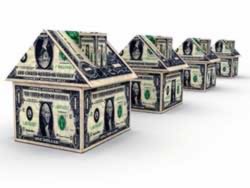Why you shouldn’t keep a mortgage just for the tax deduction
This article was written by CJ at WiseMoneyMatters.com. This post represents CJ’s viewpoints, which are not necessarily my viewpoints. (Although I, too, hope to pay off my mortgage early.)
 The other day, I was telling my wife’s grandmother that we had sold our house. We are downsizing in order to eliminate our mortgage more quickly. It looks like we will have our mortgage completely paid off in three to five years, depending on when kids enter the scene. She gave me a speech about how our house is one of the only tax deductions we have, and how most accountants recommend you keep a mortgage payment for that reason.
The other day, I was telling my wife’s grandmother that we had sold our house. We are downsizing in order to eliminate our mortgage more quickly. It looks like we will have our mortgage completely paid off in three to five years, depending on when kids enter the scene. She gave me a speech about how our house is one of the only tax deductions we have, and how most accountants recommend you keep a mortgage payment for that reason.
I think this logic is misguided. Let me show you why.
The Standard Deduction
The 2009 standard deduction for married couples will be $11,400. That means in order to gain any benefit from tax deductions, your interest paid must exceed this number. In other words, you would have to pay $950 per month in mortgage interest (not principal) in order to see any tax benefit from your mortgage payment.
If you had a mortgage on a $200,000 house at 6.25%, you would be barely exceeding the standard deduction for the first few years, assuming the deduction never increases (which it usually does). After that, you would be better off taking the standard deduction assuming you receive no other deductions.
So, in reality, such a tax deduction would only be helpful in house purchases in which your mortgage is $200,000 or more. Anything else and it’s almost pointless.
J.D.’s note: As I usually do with articles like this, I asked my accountant for feedback. His response was: “This article seems accurate, but the author makes the assumption that an individual will only have mortgage interest to deduct when comparing to the standard deduction. Other items that are deductible include state income taxes, property taxes, and charitable donations.”
He also added: “You should not look at the tax savings as the reason to purchase a home. It is only one component, and a minor one at that.” Basically, he agrees with CJ.
A Poor Trade
If you do itemize deductions, you’re still paying more in interest than you’ll save on taxes. This is the second thing that people overlook.
If you are paying over $11,400 in interest, that does not mean that you are paying $11,400 less in taxes. It means that $11,400 of your income is not counted as taxable income.
Let’s say you’re in the 25% tax bracket. If you pay $20,000 in mortgage interest, it will save you $5,000 in taxes. $20,000 of your income does not count towards taxes. Effectively, you are paying $15,000 to get your tax deduction. This is not the most financially sound advice I’ve ever heard. If you take such advice, I’ve got a really good deal. I will pay you $33 in exchange for $100. That’s the same type of financial advice as someone telling you that keeping a mortgage is a good thing for tax reasons.
The Risk Factor
The final benefit to paying off your mortgage is that it reduces financial risk to yourself.
Keeping a mortgage payment (and especially a high mortgage payment) is risky. In the unfortunate circumstance that you lose your primary source of income, your largest “asset” can quickly turn into your largest liability. This is a big reason why so many people are facing foreclosure these days. They got into a mortgage payment they couldn’t afford (or could barely afford) and all of a sudden when a small hiccup comes up in life, they are living on the street. Emergency funds are important to help offset these risks, but to truly eliminate the risk, you should pay off your mortgage.
I’ve heard of people who took out mortgages on their homes during the housing bubble so that they could invest the money in stocks. They argued that you get the tax benefit and stocks appreciate quicker than a house. As we can see now, this is an unwise financial decision. Sure, you could make lots of money. You could also make lots of money by winning the lottery, but that doesn’t make it a wise retirement plan.
When it comes down to it, I would rather have the safety of knowing that if the economy crashed and I had to work at McDonald’s for the rest of my life, I could still survive just fine with my current lifestyle.
Final Thoughts
While I know there are a lot of variables and other tax deductions I didn’t cover here, I think it’s safe to say that the old notion that keeping a mortgage simply for its tax benefits is not the best advice you can get. When it comes down to it, get the financial advice of a professional regarding your individual situation but don’t simply take their word for it. Have them show you the numbers before you start throwing your money away. I’d argue that even if the numbers are close, the risk factor puts paying off the mortgage in a slightly better position than not.
I’d love to hear some comments or scenarios where keeping a mortgage is better than taking the standard deduction.
Become A Money Boss And Join 15,000 Others
Subscribe to the GRS Insider (FREE) and we’ll give you a copy of the Money Boss Manifesto (also FREE)

